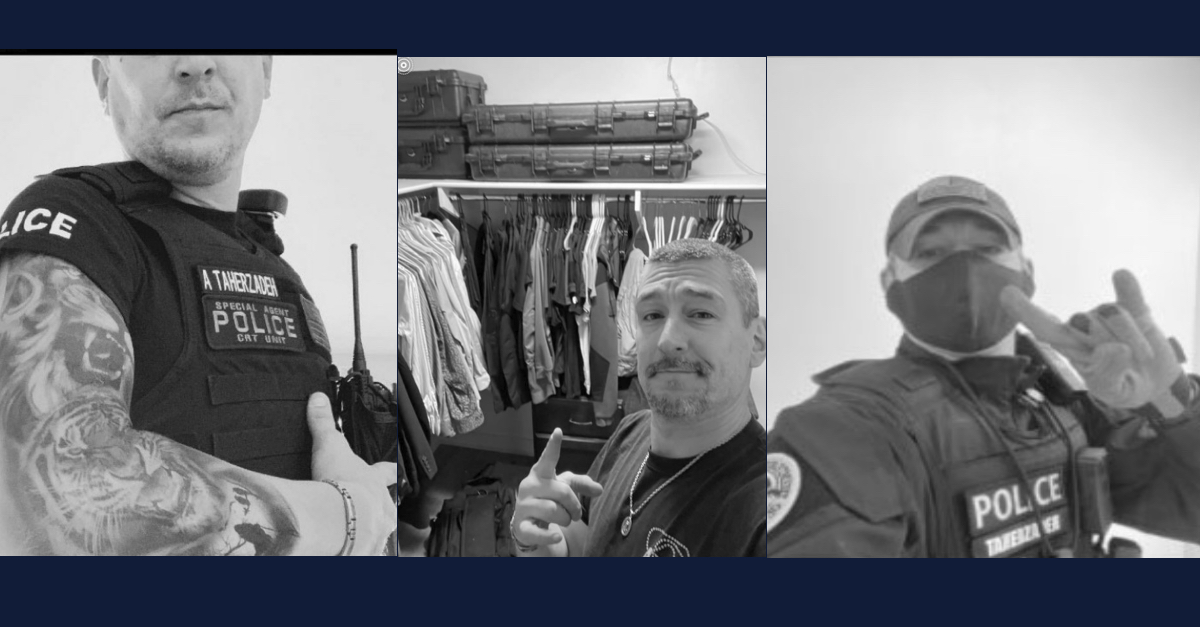
Arian Taherzadeh (via DOJ court filing)
The two men accused of impersonating Homeland Security agents in order to allegedly get close to high-level federal law enforcement employees will not be kept behind bars pending trial.
After three days of hearings, U.S. Magistrate Judge G. Michael Harvey issued his ruling late Tuesday granting Arian Taherzadeh and Haider Ali freedom as the government’s case against them proceeds.
The men are accused of posing as Homeland Security agents for years, using their false identities to get close to actual law enforcement officials, including a Secret Service agent assigned to the detail of First Lady Dr. Jill Biden. They allegedly offered gifts to residents, many of whom work for federal law enforcement agencies, including the FBI, Secret Service, Homeland Security, the Department of Defense, and the Navy.
Taherzadeh and Ali also allegedly gained access to the security system for the entire apartment complex.
Harvey first heard arguments on the government’s motion to detain both men on Friday, but did not issue a ruling at that time. He heard additional arguments on Monday and earlier Tuesday before ultimately making his ruling late Tuesday afternoon.
In ruling against the government, Harvey said that the government hadn’t met its burden of showing that they were dangerous.
The judge specifically addressed an alleged “hazing” ritual that Taherzadeh and Ali carried out on a would-be recruit, in which they apparently shot the subject with an Airsoft rifle.
“It strikes me as sophomoric behavior, not the sort of serious dangerous conduct that militates in favor of pretrial detention,” Harvey said.
He also said that the men’s efforts to ingratiate themselves with a Secret Service agent who lived at the apartment complex where they allegedly carried out their scheme was also relatively benign, noting that the government had “proffered zero evidence that defendants intended to infiltrate the Secret Service for nefarious purposes.”
Harvey did say that the government did appear to have enough evidence to convict both defendants of the crimes with which they are currently charged, particularly as to Taherzadeh, but that the strength of the evidence was the least important statutory factor in considering whether to order pretrial detention.
“A violation of [18 U.S. Code] section 912 requires more than mere bravado,” Harvey said. “There was a lot of bravado here.”
In analyzing whether the men are a flight risk, Harvey agreed with the defense argument that although they are charged with a felony, the maximum penalty is three years in prison. Since neither Ali nor Taherzadeh have serious criminal histories, the judge noted, they would likely serve no more than several months of probation, if convicted.
Harvey also said that the government’s initial argument that Ali was a flight risk because he was working either with or on behalf of a Pakistani intelligence agency had withered once prosecutors had “disavowed” that position, even if Ali had indicated as much.
There is “no reliable evidence of any foreign involvement in this case,” Harvey said, adding that he didn’t find Ali’s statements that he has “ties” to Pakistan reliable.
“The whole theory of the case is that he is not to be trusted when he says who he works for,” Harvey noted, adding: “I do not credit the statement.”
In considering whether the men pose a danger to the community, Harvey noted the highly-public nature of the case, sparked by the splashy raid on the apartment complex.
The men were “so spectacularly outed” that they are now “infamous,” and would simply be unable to convince anyone that they are federal agents.
Harvey ordered that the men not be released before 9 a.m. on Wednesday, giving the federal government time to determine whether it will appeal the ruling.
[Image via FBI court filing.]